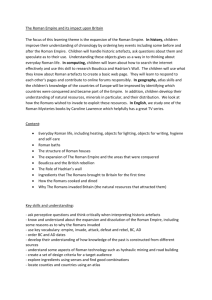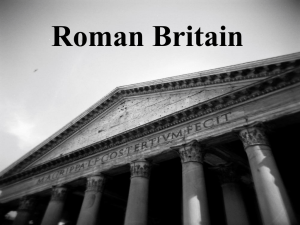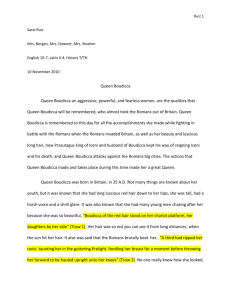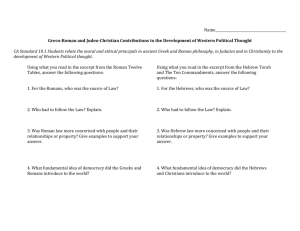Rabin Jacob Rabin Bergen/Downer English 10-2/Latin II
advertisement
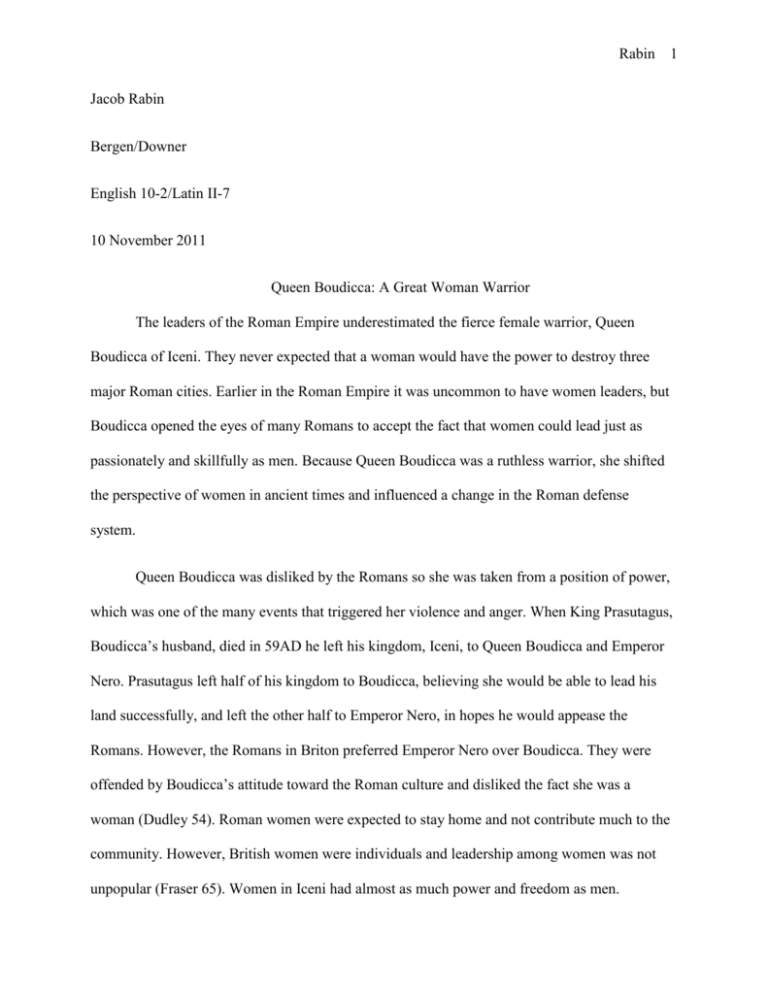
Rabin 1 Jacob Rabin Bergen/Downer English 10-2/Latin II-7 10 November 2011 Queen Boudicca: A Great Woman Warrior The leaders of the Roman Empire underestimated the fierce female warrior, Queen Boudicca of Iceni. They never expected that a woman would have the power to destroy three major Roman cities. Earlier in the Roman Empire it was uncommon to have women leaders, but Boudicca opened the eyes of many Romans to accept the fact that women could lead just as passionately and skillfully as men. Because Queen Boudicca was a ruthless warrior, she shifted the perspective of women in ancient times and influenced a change in the Roman defense system. Queen Boudicca was disliked by the Romans so she was taken from a position of power, which was one of the many events that triggered her violence and anger. When King Prasutagus, Boudicca’s husband, died in 59AD he left his kingdom, Iceni, to Queen Boudicca and Emperor Nero. Prasutagus left half of his kingdom to Boudicca, believing she would be able to lead his land successfully, and left the other half to Emperor Nero, in hopes he would appease the Romans. However, the Romans in Briton preferred Emperor Nero over Boudicca. They were offended by Boudicca’s attitude toward the Roman culture and disliked the fact she was a woman (Dudley 54). Roman women were expected to stay home and not contribute much to the community. However, British women were individuals and leadership among women was not unpopular (Fraser 65). Women in Iceni had almost as much power and freedom as men. Rabin 2 Unfortunately for Boudicca, Rome controlled the kingdom of the Iceni and “the local Roman administration reacted immediately and unfavourably to the will of King Prasutagus” (Fraser 61). Throwing Boudicca from power initiated her anger toward the Roman Empire. If the Romans realized that women leaders could rule as efficiently as male leaders, as Boudicca demonstrated by the way she lead her army, the three cities that were demolished might have been preserved. The Roman administration forcefully took her power, but Boudicca viscously attacked the Roman Empire and regained some of the power she lost in Iceni. Emperor Nero overthrew Boudicca from power. His first action was to treat Boudicca and her daughters as criminals (Meltzer 29). Nero ordered the Iceni women to be abused to show Iceni people who their true leader was. However, Emperor Nero did not just treat nobility poorly; he treated everyone in Iceni badly. The Iceni homes were forfeited to the Romans “for no crime except the death of their king-and members of the Prasutagus’ own court were humiliated and maltreated.” (Fraser 61). As if taking over Iceni, flogging Boudicca, raping her daughters, and disrespecting King Prasutagus’s will was not enough, Nero surrendered Iceni houses to the Romans and ignored the needs of Iceni people. Emperor Nero did not possess the skills to rule over such a kingdom. This made Queen Boudicca angrier than she had ever been. She could have handled being treated as a criminal and even being thrown from power, but as soon Emperor Nero mistreated the people of Iceni, Boudicca started to form an army to revolt. The Romans lived in a patriarchal society, where the women were not treated as individuals. In Briton, it was acceptable to have a woman as your leader or queen. Women in Rome did not have as many rights as men and had to stay home most of the day. One of the main reasons the Roman administration forced Boudicca out of power was because she was a woman. They also scourged her because “the Romans happened to believe that a woman as a whole was Rabin 3 incapable of rule because they were incapable of discipline” (Fraser 63). This quote is ironic because the Romans decided Queen Boudicca could not rule because of her femininity, but, in actuality, it was this idea that sent Boudicca into a rampage that resulted in the destruction of three Roman cities. Boudicca was obviously capable of discipline, which according to Romans would make her suitable to rule. Little did they know, Queen Boudicca would lead one of the most surprising revolts in all of Roman history, and changed the perception of women’s ability to lead. Boudicca herself had an interesting image of intimidation. Boudicca was very large of frame, “terrifying of aspect, and with a harsh voice. A great mass of bright red hair fell to her knees…now she grasped a spear, ready to strike fear into all who watched her” (Dio Cassius). The Romans did not expect a leader who was a woman warrior, especially one with such an intimidating presence. Most women in 60AD were not portrayed as scary or terrifying, but Boudicca and her army were known as “barbarians”. After Boudicca’s great revolt, the Romans no longer viewed all women as petite and feared Queen Boudicca greatly. In the future, they perceived women leaders just as intimidating and terrifying as male leaders. The Romans feared Boudicca and were humiliated that three major Roman cities were destroyed by a woman. She became a major threat to the Roman Empire, and “all this ruin was brought upon the Romans by a woman, a fact which caused them great shame” (Dio qtd. Fraser 58). The Romans underestimated Queen Boudicca’s power. She destroyed Colchester, London, and Verlamium and burned them all to the ground. The Romans were embarrassed by their loss, not only because parts of Rome were destroyed, but because the person who caused it all was a woman. Since it caused “shame” to the Romans, they obviously did not encourage women leaders; however Boudicca showed them that women were capable to be leaders. Rabin 4 The Roman defensive forces greatly improved because of Boudicca’s revolt. The Empire was still expanding and the Roman army, still strong and powerful, was fighting in Wales. This was pristine time for Boudicca and her army to strike, so they attacked Colchester, a popular city known as the “showcase” of the Roman Empire (Meltzer 30). Since the Roman army was unavailable, Rome sent ex-soldiers to fight for Colchester with the assumption of easily defeating Boudicca. The ruthless queen surprisingly won in two days and the “news of Boudicca’s attack on Colchester shocked the Romans to the core” (Collingridge 208). When the Romans heard they were being attacked by the Iceni, they didn’t think anything of it because Rome had an exceptional army and the Iceni revolt was led by a woman. The result of the battle at Colchester scared the Romans and they started to understand the importance of having a good defense against any military threat. Rome underestimated the power of Boudicca and her army, but learned quickly that no enemy should be ignored. The Romans thought they could defeat Boudicca and her army at Colchester so easily, that they sent their weakest forces, but Boudicca had a massive victory. Rome was embarrassed due to the defeat and “the immediate problem… was to get back from the North Wales coast as quickly as possible to meet the rebels in battle and redeem the honour of the empire” (Collingridge 208). Soon after the battle of Colchester, the Roman army understood just how dangerous a woman and her followers could be. They also realized that the Roman Empire was not invincible. The Romans were starting to be more cautious of any army, whatsoever, that threatened the Roman Empire. After Boudicca, the Roman Empire focused more on maintaining the land they already had, instead of expanding into Briton. Boudicca planned to attack London next, but she and her army traveled at a slow-pace. Enough time past that Paulinus, a Roman governor, could ride on horseback to London and have Rabin 5 the majority of people evacuated (Dudley 56). As Boudicca and her army lined up to battle, “Paulinus…gave the command to gather together as many of the population who were willing and able to leave…as quickly as possible” (Collingridge 216). The Romans feared Boudicca and did not want to take a chance against her vicious army. The Romans treasured their land, but they sacrificed London to save lives of the Roman people. The Roman leaders understood that the Romans, themselves, were at a greater importance than the actual cities of their Empire. To further protect Romans, the army would not underestimate any possible threat toward the Roman Empire and defend their land to the best of their ability. The generals of the Roman army conceived this idea and acted upon it in the future, strengthening the security of the Roman Empire. The fall of London forced the Romans to believe Boudicca and her army was a serious threat. Finally, the Roman army encountered Boudicca and her huge army. By this time, Boudicca recruited enough people to outnumber the Roman army ten to one. However, Paulinus was very clever in strategic planning and tactics; he “chose a position…where an open plain extended without any threat of ambush” (Tacitus qtn. Collingridge 230). The plain was surrounded by a forest, so only few of Boudicca’s soldiers could fight at one time. Paulinus specifically choose this one spot for battle, so the Romans would have a chance at victory. Historians cannot exactly pinpoint the location of this battle, but it obviously had great strategic advantages, because the Romans ended up winning and thousands of Britons died. This story demonstrated that the Roman leaders viewed Boudicca as a serious threat. Paulinus took the time to scope the battlefield before the last battle, which shows how Boudicca’s revolt bettered the Roman defenses. These defense tactics stayed with the Roman army until the Empire fell. As a Rabin 6 result of Boudicca’s strength as a warrior, Rome never again underestimated an opponent in war and became much more cautious about rebellions against the Roman Empire. Queen Boudicca was a fearless leader and fierce female warrior who changed Roman leaders’ perspective on ancient women and the Roman defense systems. Her cunning mind challenged the military rulers of Rome and strengthened the Empire. Before Boudicca’s great rebellion, the Romans thought they were invincible and they focused on expansion to increase the power of the empire. After Boudicca died, small Roman armies guarded the boarder out of paranoia from Boudicca’s attacks, which ended up further protecting the Roman people. Queen Boudicca’s leadership showed the extent of the impact one rebellion can make. The Roman Empire understood how fierce a woman can be as a leader and as a warrior. Queen Boudicca stood up to the Roman army after she was thrown from power and fought for the rights of her people, making her a great woman in history. Rabin Works Cited Collingridge, Vanessa. Boudica: The Life of Britain’s Legendary Warrior Queen. The Overlook Press. 2006. Dio, Cassius. Roman History. Translated by Ernest Cary. Loeb Classical Library. 1980. Dudley, Donald R. The Rebellion of Boudicca. London: Routledge and Kegan Paul.1963. Fraser, Antonia. Warrior Queens. New York: Vintage Books, 1990. Meltzer, Milton. Ten Queens. New York: Dutton Children’s Books, 1998. 7

